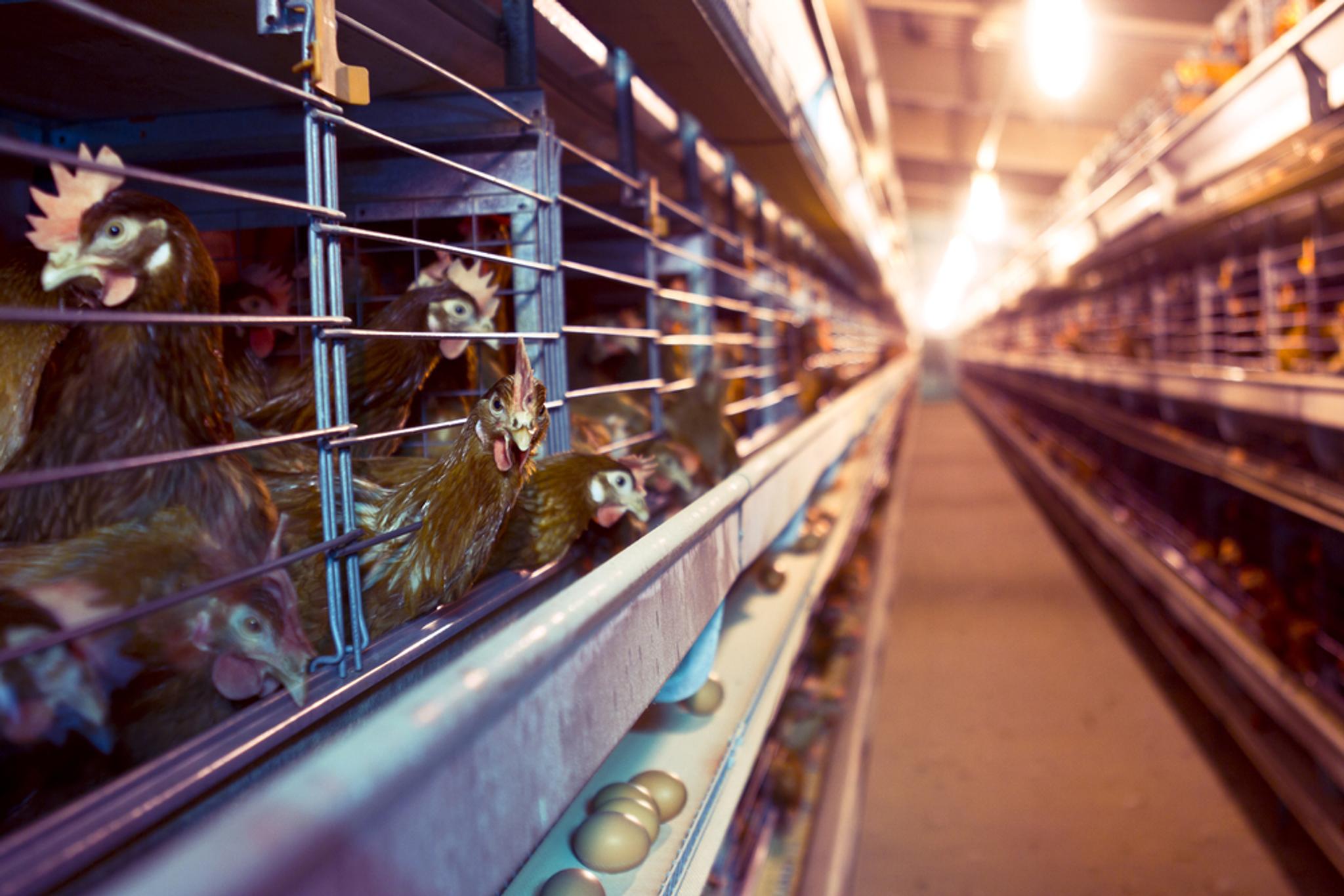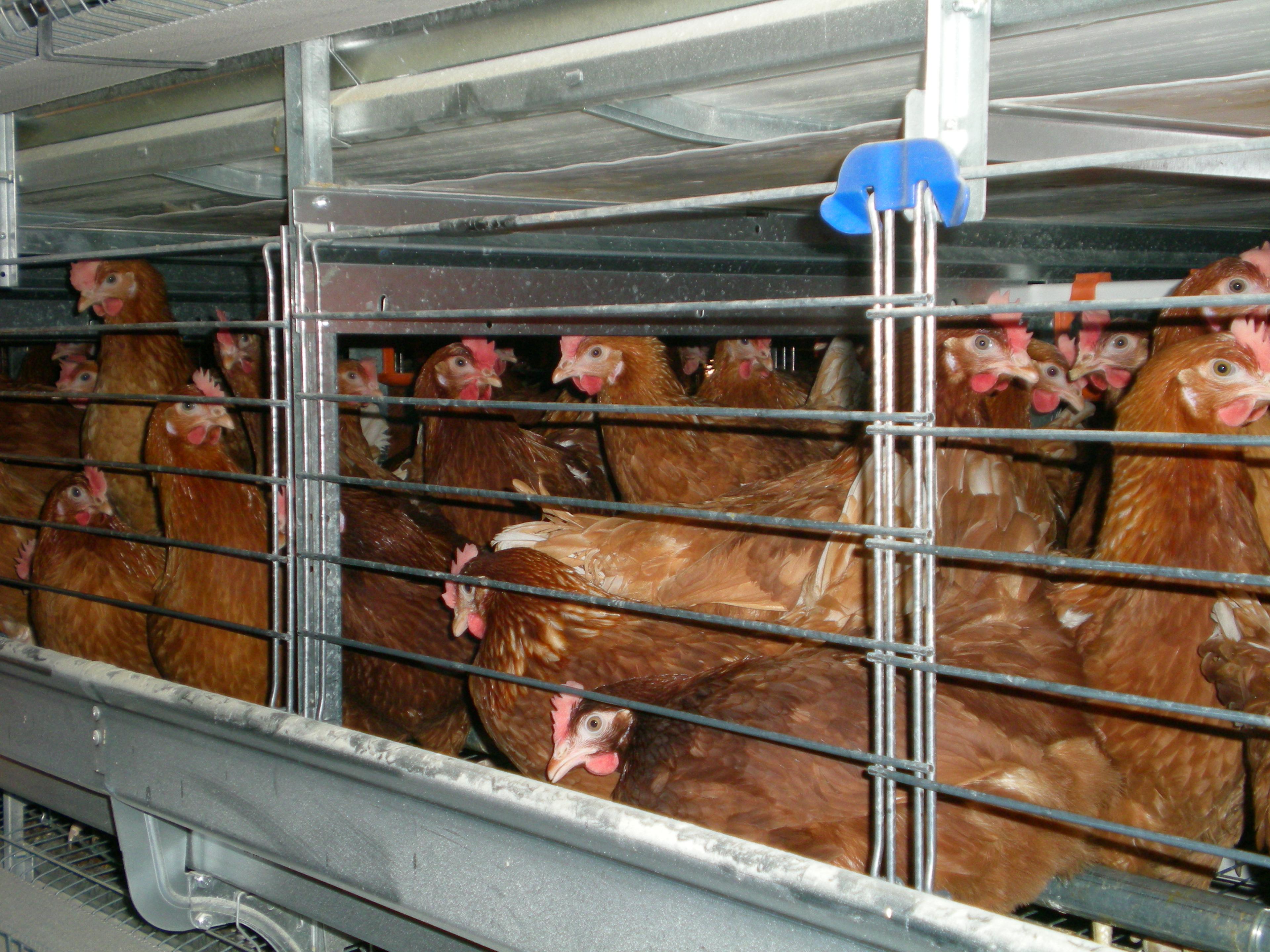Are battery hens a thing of the past? Sadly, no
By Dr Charlotte Arthur, senior scientific and policy officer for poultry, RSPCA

Many people think hens stopped being kept in cages years ago. I wish that were true.
Conventional ‘battery cages’ were banned across Europe back in 2012 – and many people assume that means all hens are now free-range.
But the reality is more complicated, sadly.
Today, millions of hens are still confined in what are known as ‘enriched’ or ‘colony’ cages. And from a welfare point of view, they’re still cages.
As someone who has spent years studying laying hens and other farmed birds and working to improve their lives, I can tell you first-hand: hens deserve far better.
What’s a battery hen?
A battery hen is an egg-laying hen kept in a traditional cage system.
Each bird was kept in a cramped wire cage, with thousands of cages stacked side by side in large sheds.
The first battery cages appeared in the 1930s, designed to make egg collection easier.
Cages were made from sloped wire floors so eggs rolled neatly out for collection.
As technology developed, automatic muck, feeding and egg collection systems were introduced.
What wasn’t fully considered was the hens’ welfare inside these changes.
Are battery cages really banned?
Not entirely. Traditional battery cages were banned across Europe in 2012, but ‘enriched’ cages took their place.
That means around 21% of hens in the UK today are kept in enriched or colony cages (DEFRA 2024).
Enriched colony cages can hold about 90 hens, and have somewhere for birds to perch, a tiny scratch mat and nest box.
These systems also typically have electrified wire, stopping hens pecking at the eggs on the collection belt.
In addition, they don’t provide ‘enrichment’, so no natural light or objects to peck at, such as straw bales, which would benefit the birds’ welfare.
Space is still extremely limited: roughly an A4 sheet of paper plus a postcard per bird.
Once inside, hens won’t leave the cage until they’re sent to slaughter at the end of their commercial egg-laying days.
These hens will never experience or benefit from natural daylight or searching for food on a range with grass and natural cover.
Globally, some commercial hens are kept in battery cages, which are not even legal in the UK or Europe.
On RSPCA Assured members’ farms, hens are never kept in cages.
Instead, they live in free-range, organic or barn systems where they have space to move, explore and behave naturally.
Why are cages bad for hens?
I’ve spent a lot of time studying and watching hens, and it’s clear to me that hens are intelligent, active animals.
Hens are most satisfied when they can express positive natural behaviours and are cared for with their welfare in mind.
Their natural behaviours include:
- Being able to move around freely
- Flap their wings
- Dustbathe to keep their feathers clean
- Perch and roost
- Scratch the ground and forage for food.
Their welfare is also improved when they’re:
- Provided with the correct nutrition and clean water
- Housed in a purpose-built, welfare-focused shed.
Cages prevent or limit most of these, leaving hens stressed, frustrated and often in poor health.

Why do battery hens lose feathers?
Feather loss is common in caged hens. It happens for two main reasons:
- Stress and frustration can cause hens to peck at each other, pulling out feathers
- Reaching through cage bars to eat can rub feathers away on their necks.
That’s why it’s not unusual to see caged hens with bald patches.
What happens to battery hens when they stop laying?
Whether hens are kept in cages, barns or free-range systems, their egg production is closely monitored.
At around 18 months old, the number of eggs they lay starts to slow down. At this point, they’re usually sent to slaughter.
Animals being killed is an uncomfortable reality of farming, which many of us don’t like to think about. So if you’re concerned about hens’ welfare but want to eat eggs, I recommend looking for the RSPCA label on the packaging.
Then you know you’re supporting farms that put hens’ welfare first at every stage – from hatching and growing through to laying – and how they’re treated when their lives come to an end.
Are free-range or barn eggs better?
It’s not as black-and-white as ‘outdoors is good, indoors is bad’. What matters most is whether hens can express their natural behaviours.
- Barn hens live indoors, on purpose-built ‘systems’ with nest boxes, perches and floors covered in litter for dust bathing
- Free-range and organic hens live in houses similar to barn hens but have access to the outdoors via ‘popholes’, with shelter from trees and bushes to help them feel safe.
Under the RSPCA Assured scheme, hens in both barn and free-range systems get more enrichment, more space and higher standards of care than the legal minimum.
How you can help
The easiest way is through the eggs you buy. Look out for labels such as RSPCA Assured, free-range, organic or barn – and avoid eggs from caged hens.
Remember, eggs aren’t only sold in boxes. They’re also in sandwiches, ready meals, cakes and quiches.
Choosing higher welfare options whenever you can sends a powerful message to supermarkets and farmers.
Together, we can make cages a thing of the past – and give every hen the chance to live a better and fulfilling life.
Frequently asked questions
Are battery hens still legal in the UK?
Conventional battery cages were banned in 2012, but ‘enriched’ or ‘colony’ cages are still legal. Around 21% of hens in the UK are kept in this way.
Are enriched cages better for hens?
They offer slightly more space and include a perch and small nesting area, but they still fall far short of meeting hens’ welfare needs. Hens in cages can’t dustbathe, peck the ground and search for food, or fully stretch their wings.
Why do battery hens sometimes look bald?
Feather loss is common in caged systems. It’s usually caused by stress-related feather pecking or feathers rubbing away when hens reach through the cage bars for food.
Tuesday 30 September 2025